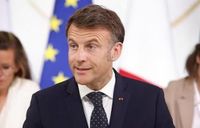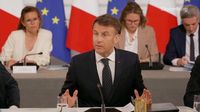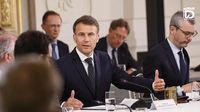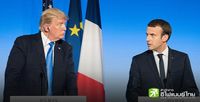French President Emmanuel Macron has called for European companies to suspend new investments in the United States in response to President Donald Trump’s newly announced import tariffs. Speaking to business representatives on April 3, 2025, Macron described the tariffs as excessively harsh and unreasonable, targeting Europe and other trading partners globally.
During the meeting, Macron emphasized that any future investments, including those recently announced, should be put on hold until the situation with the U.S. becomes clearer. He urged the European Union (EU) to unite in its response, warning against unilateral actions. "Investment that will occur or receive publicity may not be as transparent, and it will be more expensive to receive transparency from the state," he stated, highlighting the uncertainty surrounding U.S. policies.
Macron’s comments come in the wake of Trump’s announcement of a new set of tariffs, including a 20% tax on imports from the EU. French Prime Minister François Bayrou echoed Macron’s concerns, labeling Trump’s tariffs as a significant problem for Europe and a disaster for both the U.S. and its citizens. Bayrou's remarks reflect a growing apprehension in Europe regarding the potential economic fallout from such measures.
Macron further expressed that the tariffs would weaken the American economy, stating, "The fact that President Trump promotes the state language is still limited and will make it easier for America to be on its own." He criticized the tax framework set by the Washington government, asserting that it lacks a foundation based on fundamental principles of reality and would have widespread ramifications for the global economy, including Europe.
In a strategic move, the French government has indicated that the EU is preparing a two-phase response to the tariffs, with the first phase targeting aluminum and steel imports around mid-April. Following this, the EU plans to expand its focus to encompass all goods and services, with measures expected to be finalized by the end of April. A government spokesperson confirmed that discussions are ongoing regarding potential retaliatory actions, which may include targeting services like online platforms, which currently do not face tariffs.
Macron's call for investment suspension also follows the announcement by French shipping giant CMA CGM of a $20 billion investment plan in the U.S. to enhance logistics and port facilities. This plan had previously received support from the Trump administration but is now under scrutiny due to the evolving trade landscape.
Another French company, Schneider Electric, revealed plans to invest $700 million in the U.S. to bolster energy infrastructure and support AI development. However, Macron indicated that he has not ruled out retaliatory measures against Trump’s tariffs, suggesting the use of anti-coercion mechanisms, a tool employed by the EU to protect its trade interests. He noted that responses to U.S. steel and aluminum tariffs would be "more severe" than previous retaliatory measures.
The ongoing trade tensions have raised alarms among French industry leaders. According to "France Industrie," a coalition of major industrial players in France, companies affected by Trump’s tariffs, including those on steel and aluminum at rates of 25%, should consider their own countermeasures. The French Chamber of Commerce in the U.S. reported that there are currently over 4,200 branches of French companies in the U.S., employing approximately 741,000 individuals.
Macron’s remarks reflect a growing sentiment among European leaders that the U.S. tariffs could destabilize not only the American economy but also the broader global economy. As tensions escalate, the EU’s coordinated response will be vital in navigating the complex landscape of international trade.
In summary, Macron's stance on suspending investments in the U.S. underscores the seriousness of the situation as European leaders grapple with the implications of Trump’s tariffs. The call for unity within the EU highlights the importance of a collective response to protect economic interests and maintain stability in international trade relations.









